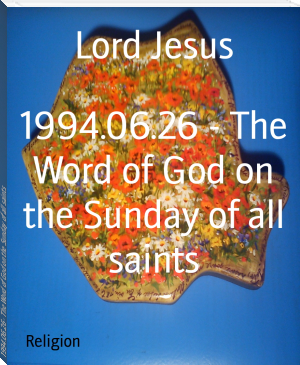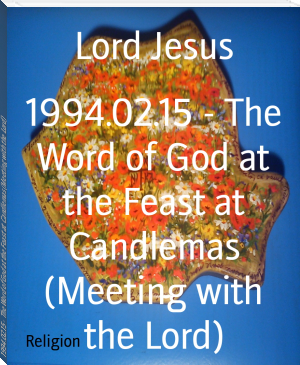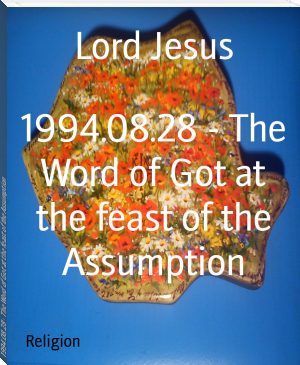Orthodoxy - G. K. Chesterton (books to read to get smarter .TXT) 📗

- Author: G. K. Chesterton
- Performer: -
Book online «Orthodoxy - G. K. Chesterton (books to read to get smarter .TXT) 📗». Author G. K. Chesterton
With all this human experience, allied with the Christian authority, I simply conclude that I am wrong, and the church right; or rather that I am defective, while the church is universal. It takes all sorts to make a church; she does not ask me to be celibate.
But the fact that I have no appreciation of the celibates, I accept like the fact that I have no ear for music. The best human experience is against me, as it is on the subject of Bach.
Celibacy is one flower in my father’s garden, of which I have not been told the sweet or terrible name. But I may be told it any day.
This, therefore, is, in conclusion, my reason for accepting the religion and not merely the scattered and secular truths out of the religion. I do it because the thing has not merely told this truth or that truth, but has revealed itself as a truth-telling thing.
All other philosophies say the things that plainly seem to be true; only this philosophy has again and again said the thing that does not seem to be true, but is true. Alone of all creeds it is convincing where it is not attractive; it turns out to be right, like my father in the garden. Theosophists for instance will preach an obviously attractive idea like re-incarnation; but if we wait for its logical results, they are spiritual superciliousness and the cruelty of caste. For if a man is a beggar by his own pre-natal sins, people will tend to despise the beggar. But Christianity preaches an obviously unattractive idea, such as original sin; but when we wait for its results, they are pathos and brotherhood, and a thunder of laughter and pity; for only with original sin we can at once pity the beggar and distrust the king. Men of science offer us health, an obvious benefit; it is only afterwards that we discover that by health, they mean bodily slavery and spiritual tedium.
Orthodoxy makes us jump by the sudden brink of hell; it is only afterwards that we realise that jumping was an athletic exercise highly beneficial to our health. It is only afterwards that we realise that this danger is the root of all drama and romance.
The strongest argument for the divine grace is simply its ungraciousness.
The unpopular parts of Christianity turn out when examined to be the very props of the people. The outer ring of Christianity is a rigid guard of ethical abnegations and professional priests; but inside that inhuman guard you will find the old human life dancing like children, and drinking wine like men; for Christianity is the only frame for pagan freedom. But in the modern philosophy the case is opposite; it is its outer ring that is obviously artistic and emancipated; its despair is within.
And its despair is this, that it does not really believe that there is any meaning in the universe; therefore it cannot hope to find any romance; its romances will have no plots. A man cannot expect any adventures in the land of anarchy. But a man can expect any number of adventures if he goes travelling in the land of authority. One can find no meanings in a jungle of scepticism; but the man will find more and more meanings who walks through a forest of doctrine and design. Here everything has a story tied to its tail, like the tools or pictures in my father’s house; for it is my father’s house. I end where I began—at the right end.
I have entered at last the gate of all good philosophy. I have come into my second childhood.
But this larger and more adventurous Christian universe has one final mark difficult to express; yet as a conclusion of the whole matter I will attempt to express it. All the real argument about religion turns on the question of whether a man who was born upside down can tell when he comes right way up. The primary paradox of Christianity is that the ordinary condition of man is not his sane or sensible condition; that the normal itself is an abnormality.
That is the inmost philosophy of the Fall. In Sir Oliver Lodge’s interesting new Catechism, the first two questions were: “What are you?” and “What, then, is the meaning of the Fall of Man?”
I remember amusing myself by writing my own answers to the questions; but I soon found that they were very broken and agnostic answers.
To the question, “What are you?” I could only answer, “God knows.”
And to the question, “What is meant by the Fall?” I could answer with complete sincerity, “That whatever I am, I am not myself.”
This is the prime paradox of our religion; something that we have never in any full sense known, is not only better than ourselves, but even more natural to us than ourselves. And there is really no test of this except the merely experimental one with which these pages began, the test of the padded cell and the open door. It is only since I have known orthodoxy that I have known mental emancipation.
But, in conclusion, it has one special application to the ultimate idea of joy.
It is said that Paganism is a religion of joy and Christianity of sorrow; it would be just as easy to prove that Paganism is pure sorrow and Christianity pure joy. Such conflicts mean nothing and lead nowhere. Everything human must have in it both joy and sorrow; the only matter of interest is the manner in which the two things are balanced or divided. And the really interesting thing is this, that the pagan was (in the main) happier and happier as he approached the earth, but sadder and sadder as he approached the heavens.
The gaiety of the best Paganism, as in the playfulness of Catullus or Theocritus, is, indeed, an eternal gaiety never to be forgotten by a grateful humanity. But it is all a gaiety about the facts of life, not about its origin. To the pagan the small things are as sweet as the small brooks breaking out of the mountain; but the broad things are as bitter as the sea. When the pagan looks at the very core of the cosmos he is struck cold. Behind the gods, who are merely despotic, sit the fates, who are deadly. Nay, the fates are worse than deadly; they are dead. And when rationalists say that the ancient world was more enlightened than the Christian, from their point of view they are right. For when they say “enlightened” they mean darkened with incurable despair. It is profoundly true that the ancient world was more modern than the Christian. The common bond is in the fact that ancients and moderns have both been miserable about existence, about everything, while mediaevals were happy about that at least.
I freely grant that the pagans, like the moderns, were only miserable about everything—they were quite jolly about everything else.
I concede that the Christians of the Middle Ages were only at peace about everything—they were at war about everything else.
But if the question turn on the primary pivot of the cosmos, then there was more cosmic contentment in the narrow and bloody streets of Florence than in the theatre of Athens or the open garden of Epicurus. Giotto lived in a gloomier town than Euripides, but he lived in a gayer universe.
The mass of men have been forced to be gay about the little things, but sad about the big ones. Nevertheless (I offer my last dogma defiantly) it is not native to man to be so. Man is more himself, man is more manlike, when joy is the fundamental thing in him, and grief the superficial. Melancholy should be an innocent interlude, a tender and fugitive frame of mind; praise should be the permanent pulsation of the soul. Pessimism is at best an emotional half-holiday; joy is the uproarious labour by which all things live. Yet, according to the apparent estate of man as seen by the pagan or the agnostic, this primary need of human nature can never be fulfilled.
Joy ought to be expansive; but for the agnostic it must be contracted, it must cling to one corner of the world. Grief ought to be a concentration; but for the agnostic its desolation is spread through an unthinkable eternity. This is what I call being born upside down. The sceptic may truly be said to be topsy-turvy; for his feet are dancing upwards in idle ecstasies, while his brain is in the abyss. To the modern man the heavens are actually below the earth. The explanation is simple; he is standing on his head; which is a very weak pedestal to stand on. But when he has found his feet again he knows it. Christianity satisfies suddenly and perfectly man’s ancestral instinct for being the right way up; satisfies it supremely in this; that by its creed joy becomes something gigantic and sadness something special and small.
The vault above us is not deaf because the universe is an idiot; the silence is not the heartless silence of an endless and aimless world.
Rather the silence around us is a small and pitiful stillness like the prompt stillness in a sick-room. We are perhaps permitted tragedy as a sort of merciful comedy: because the frantic energy of divine things would knock us down like a drunken farce. We can take our own tears more lightly than we could take the tremendous levities of the angels. So we sit perhaps in a starry chamber of silence, while the laughter of the heavens is too loud for us to hear.
Joy, which was the small publicity of the pagan, is the gigantic secret of the Christian. And as I close this chaotic volume I open again the strange small book from which all Christianity came; and I am again haunted by a kind of confirmation. The tremendous figure which fills the Gospels towers in this respect, as in every other, above all the thinkers who ever thought themselves tall. His pathos was natural, almost casual. The Stoics, ancient and modern, were proud of concealing their tears. He never concealed His tears; He showed them plainly on His open face at any daily sight, such as the far sight of His native city. Yet He concealed something.
Solemn supermen and imperial diplomatists are proud of restraining their anger. He never restrained His anger. He flung furniture down the front steps of the Temple, and asked men how they expected to escape the damnation of Hell. Yet He restrained something.
I say it with reverence; there was in that shattering personality a thread that must be called shyness. There was something that He hid from all men when He went up a mountain to pray. There was something that He covered constantly by abrupt silence or impetuous isolation.
There was some one thing that was too great for God to show us when He walked upon our earth; and I have sometimes fancied that it was His mirth.
End of the Project Gutenberg Etext of Orthodoxy by G. K. Chesterton





Comments (0)